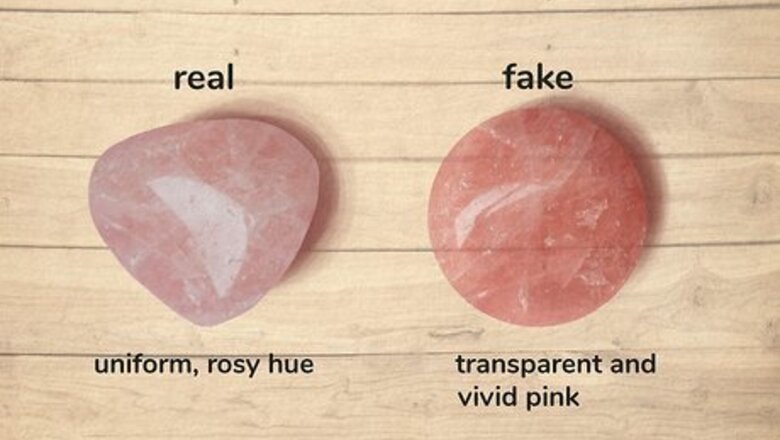
views
- Real rose quartz has a soft pink color, cloudy appearance, flaws like inclusions, and a rough and irregular shape.
- Real rose quartz can scratch glass and feels cool and heavy.
- Buy rose quartz from certified sellers who source the gem from known mining locations and price it fairly.
Real Rose Quartz
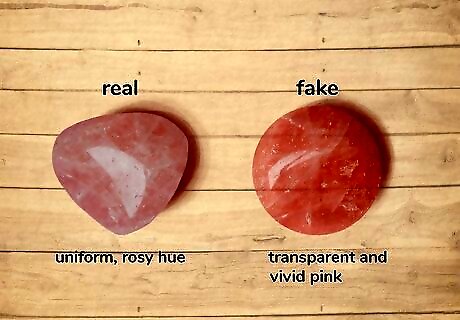
Light pink Real rose quartz ranges from light to dark pink in color. Look at your rose quartz to see if it is a uniform, rosy hue. Most small pieces of quartz are a very soft pink, sometimes almost white, while larger pieces can be medium to dark pink. If your rose quartz is transparent and vivid pink, it’s probably fake. Manufacturers have to dye the glass or plastic which often results in shiny, vibrant pinks.
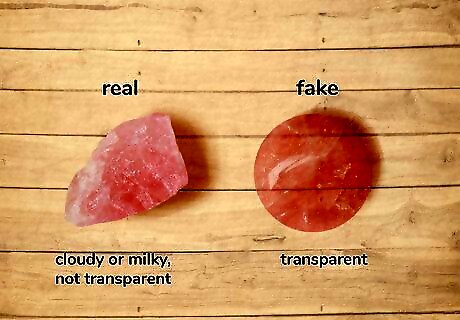
Cloudy Rose quartz looks cloudy or milky, not transparent. Rose quartz gets its hazy appearance because it is full of inclusions, or other minerals and materials. These inclusions make the quartz less transparent and sometimes even opaque. If you are looking at rose quartz jewelry, it is often faceted, or cut and polished, and will appear more transparent. Look for other characteristics to determine if the rose quartz is real.
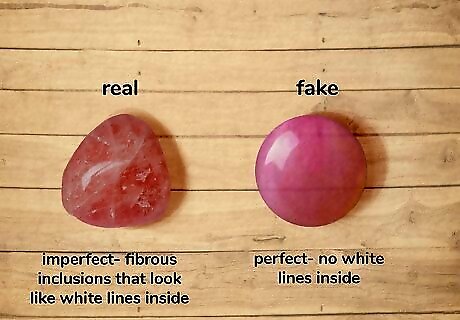
Imperfect True rose quartz is full of other minerals and fibers that you can see. When you look at rose quartz, you will see fibrous inclusions that look like white lines inside. These lines often give rose quartz a marbled appearance. You might need a magnifying glass to see the lines within your rose quartz.
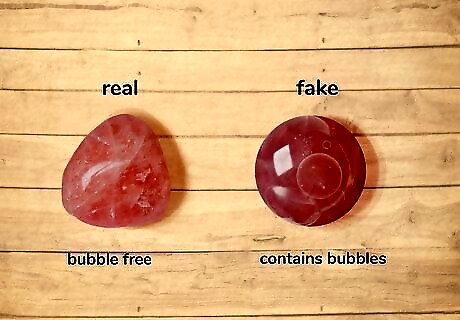
Bubble free Real rose quartz has irregularities, but bubbles aren’t one of them. Most fake rose quartz is made from glass that is poured into molds. Small, round bubbles usually form during the pouring process, so if you see any in your rose quartz, it’s likely fake.
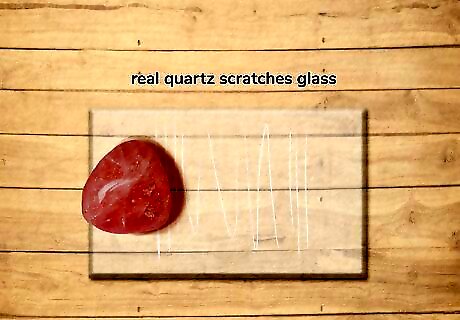
Scratches glass Rose quartz is a durable mineral that is harder than glass. To test if your rose quartz is genuine, try to scratch a piece of glass, such as a glass bottle. If you easily make a mark on the glass, your rose quartz is likely the real deal. Geologists rate minerals on a hardiness scale from 1 to 10, called the Mohs scale. Rose quartz is about a 7 on the scale while glass is about a 5.
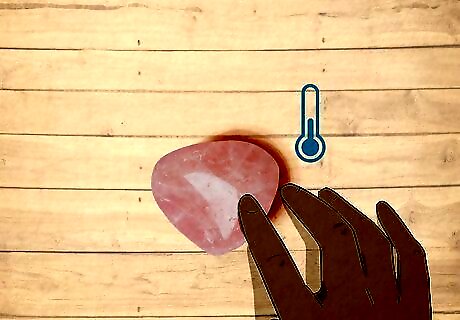
Cool to the touch If your rose quartz feels cool when you pick it up, it's likely real. While rose quartz will warm up to your body temperature, it doesn’t retain heat and often feels cooler than room temperature. Set your rose quartz on a table with a piece of glass, like a marble. If your rose quartz is real, it will feel cooler than the piece of glass.
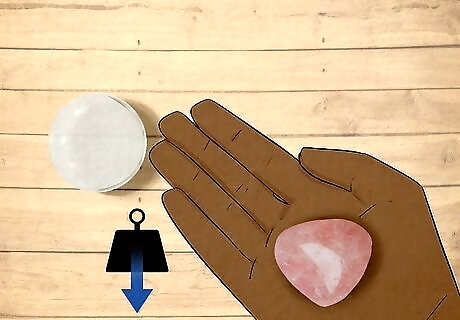
Heavy The other minerals in rose quartz make it heavier than glass. To test if your rose quartz is real, hold it in one hand and a similar sized piece of glass in your other. The difference might be subtle, but if the rose quartz feels heavier, it’s likely real.
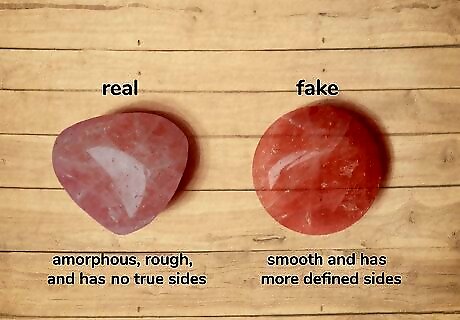
Irregularly shaped Raw rose quartz is rugged and jagged. If your rose quartz is real, it will be amorphous, feel rough, and have no true sides. Fake rose quartz will usually be smooth and have more defined sides. Rose quartz is often tumbled, meaning that the rough edges are smoothed out and polished to a shine. Real rose quartz that is tumbled still won’t have defined sides, but check other characteristics to see if it's real.
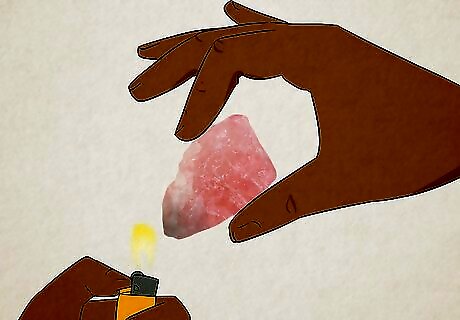
Doesn’t melt Real rose quartz has a melting point of 3000° F (1650° C). If you’re unsure whether your rose quartz is real or not, hold a lighter over it. Fake quartz made out of glass or plastic has a lower melting point and will distort and liquify. If you try the burn test and your rose quartz is real, it might get a little sooty. Simply wipe off the soot with a towel.
How to Buy Real Rose Quartz

Buy rose quartz from certified sellers who have great reviews. When you are looking online, check if the seller and their pieces are certified with the Gemological Institute of America (GIA). Be sure to also look through customer reviews to see if buyers are happy with their purchases. Look through the seller’s website to see their credentials and if they offer certificates of authenticity.
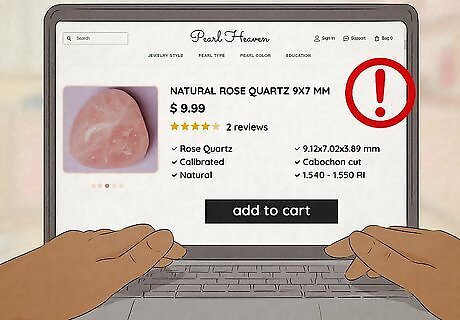
Be wary of cheap prices. If you find rose quartz that is large, bright, and cheap, it’s likely fake. Real rose quartz is not perfectly shaped or vividly colored, with smaller pieces typically costing about $2-4 per carat (1 carat is equal to 200 milligrams). A large and deeply colored rose quartz can cost $100 to $1,000 depending on its quality. Authentic rose quartz rings, necklaces, and earrings will typically cost you $75 and up.

Ask where the rose quartz is from. Most rose quartz is mined in North America, Madagascar, and Brazil. Rose quartz is actually a common gemstone that is found all around the world. However, most rose quartz is mined in these locations, so be wary of shops that state their gems are from elsewhere. Real rose quartz is also mined in India, Japan, Russia, and Sri Lanka.



















Comments
0 comment